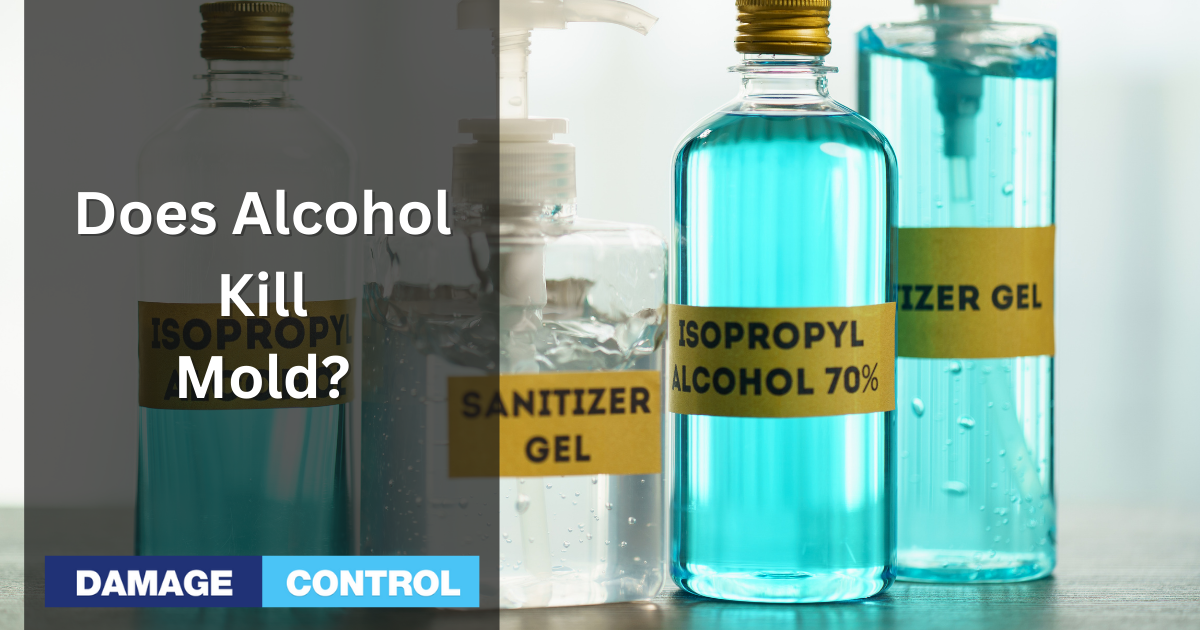When you encounter mold in a home, it can be either a minor nuisance or a major calamity. Mold in the home is more dangerous than most would think. Mold has been used as a bioweapon for a long time.
With so much at stake, asking the right questions is vital, such as does alcohol kill mold? It's usually available in the average home and is dirt cheap, making it an appealing option… if it works.
There are numerous ways to deal with mold in its early stages, and numerous tools and cleaners are prevalent and popular. However, it is commonly questioned whether or not alcohol is an effective mold killer.
Ready to dive in and learn the truth, with details?
Let's get started.
How Alcohol Works as a Mold Killer
What you need to understand about alcohol as a mold killer is that directly killing the mold is not its purpose. Alcohol acts more like a disinfectant, an emulsifier, and a drying agent.
These are fun properties in regard to cleaning and even preventing mold. However, they are not particularly advantageous if you aim to kill the mold.
It is less effective than other cleaning solutions, such as white vinegar or bleach.
Some people make the mistake of thinking it will be effective due to a misunderstanding of the nature of the mold. Some people believe the false idea that mold is like a virus or bacteria when it is, in fact, a fungus.
That is not to say that alcohol is entirely useless. Its drying agent capabilities help make an environment more hostile to mold growth. As a result, it can play an integral part in the mold prevention process.
How Effective is Using Alcohol to Kill Mold?
Alcohol is effective at killing some common types of mold, but it is not particularly effective against the most prevalent molds that plague homeowners.
Pros of Using Alcohol to Kill Mold
Perhaps the biggest pro of using alcohol to kill mold is its capabilities as a drying agent. Mold thrives in environments that provide both moisture and nutrients that it can feed off of.
Without those two things, mold is incapable of thriving. Because alcohol can dry a surface out after being applied, it can rob mold of the moisture it requires.
Cons of Using Alcohol to Kill Mold
While it is true that alcohol can kill some surface-level mold, it is almost completely ineffective at killing mold spores. Since mold spores are how mold spreads, alcohol can only be used in highly specific circumstances for mold prevention.
How to Use Alcohol to Kill Mold
Safety Precautions
When cleaning mold, regardless of the cleaning solution you use, you want to make sure to have the proper protection. You will need a facial covering, preferably a respirator to prevent you from inhaling any mold spores.
You will also need rubber gloves, a Tyvek suit, and safety goggles to be safe.
Tools and Materials Needed
- Soft-bristled brush
- Spray bottle
- Dry towel
- Rinsing bucket
Cleaning the Mold
As previously stated, alcohol is not particularly effective at killing mold. However, it can kill some lower-level surface molds.
Take your alcohol and place it in your spray bottle. Spray down the mold-afflicted surface and allow it to set for a few seconds before scrubbing with your soft bristled brush. Then rinse your brush and repeat the process until the mold is gone.
When this is done, wipe the area with your dry towel.
Surfaces to Clean with Alcohol
While alcohol is not a typically abrasive substance, it is not recommended to use on porous materials. It seems that alcohol is at its most effective when used on non-porous materials such as marvel, plastic, or other similar surfaces.
Alternative Methods for Killing Mold
Given that alcohol is not particularly effective as a mold-killing agent, you should understand that there are better alternatives you can use that will have outstanding effects against mold.
One of the best cleaning solutions that can be used against mold is a combination of white vinegar and water. A solution of 70% water to 30% vinegar is an effective nemesis of mold within 10 to 15 minutes of being applied.
Bleach is also a popular mold-killing agent. It is best used on non-porous surfaces, and using it on porous surfaces could cause further damage.
It is always recommended that you utilize proper safety equipment and that you dilute the bleach before using. And one cup of bleach to every gallon of water.
It also must be said that commercially available cleaners are designed to kill mold. So long as you use these cleaners within the parameters of the directions included, you should be able to kill the mold quickly and efficiently.
A steamer can help with small areas because mold dies in temperatures over 140 degrees Fahrenheit.
Conclusion
While alcohol is not particularly effective in killing mold, it seems valuable in mold removal and prevention. If you can understand alcohol's place in mold removal, you will find it much easier to use in the long run for specific, light situations.

